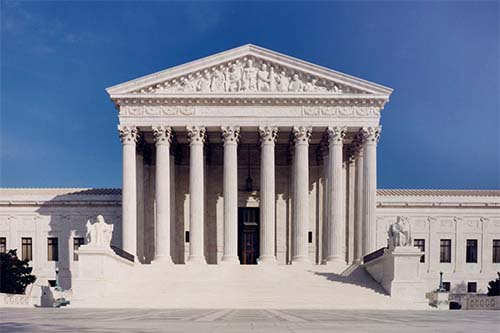
- Details
- By Native News Online Staff
WASHINGTON — The U.S. Supreme Court on Thursday ruled that a significant swath of eastern Oklahoma remains American Indian land for certain legal purposes.
The case, which was first argued more than a year ago and then pushed to the Supreme Court, is a major victory for tribal sovereignty and the Muscogee (Creek) Nation.
In a 5-4 decision, the country’s highest court ruled that Congress never “disestablished” the 1866 boundaries of the Muscogee (Creek) Nation, which encompasses three million acres and includes most of the city of Tulsa. The ruling reaffirms that the land promised to the tribe by treaty remains rightfully theirs.
“Today we are asked whether the land these treaties promised remains an Indian reservation for purposes of federal criminal law. Because Congress has not said otherwise, we hold the government to its word,” wrote Justice Neil Gorsuch in the majority opinion.
Gorsuch, a Trump-appointee with experience in federal Indian law, was joined by Justices Stephen Breyer, Ruth Bader Ginsburg, Elena Kagan and Sonia Sotomayor in the majority.
The case involved Seminole Nation citizen Jimcy McGirt (Seminole), who was convicted by an Oklahoma court of raping a 4-year-old child in 1997. He argued that because the crimes he committed took place on Creek Nation territory state courts lacked the authority to review his case.
Thursday’s ruling means McGirt’s case falls under federal jurisdiction, and that he should have been tried under the Major Crimes Act, which gives federal authorities jurisdiction over crimes committed by or against Native Americans in Indian Country. McGirt was sentenced to 500 years in prison, plus life, and without parole.
“For MCA purposes, land reserved for the Creek Nation since the 19th century remains ‘Indian country,’” Gorsuch wrote.
Oklahoma argued that the Creek Nation’s former territory was no longer a reservation.
The state said that if the Supreme Court accepted McGirt’s reasoning it would “cause the largest judicial abrogation of state sovereignty in American history, cleaving Oklahoma in half.”
Chief Justice John Roberts dissented from the ruling, along with Justices Clarence Thomas, Samuel Alito and Brett Kavanaugh.
Two national American Indian organizations, the National Congress of American Indians (NCAI) and the Native American Relief Fund (NARF) applauded the court’s decision.
“Through two terms of the United States Supreme Court, and as many cases and fact patterns, this question has loomed over federal Indian law. This morning, NCAI joins the rest of Indian Country in congratulating the Muscogee (Creek) Nation and proudly asserting that its lands remain, and will forever be considered, Indian country––as guaranteed in their treaty relationship with the United States,” said NCAI President Fawn Sharp.
NARF Executive Director John Echohawk said: “In this case, the Muscogee (Creek) Nation had to fight long and hard to protect their homelands, which were promised in their treaty agreements with the United States. In holding the federal government to its treaty obligations, the U.S. Supreme Court put to rest what never should have been at question. We congratulate the Nation on its success.”
In a statement, the Muscogee (Creek) Nation hailed the court’s ruling for upholding the “United States’ sacred promise” of a protected reservation.
“Today’s decision will allow the Nation to honor our ancestors by maintaining our established sovereignty and territorial boundaries,” the statement read. “We will continue to work with federal and state law enforcement agencies to ensure that public safety will be maintained throughout the territorial boundaries of the Muscogee (Creek) Nation.”
CLICK to read the Supreme Court decision.
More Stories Like This
Native News Weekly (August 25, 2024): D.C. BriefsScope Narrowed, Report Withheld: Questions Mount Over Michigan Boarding School Study
Zuni Youth Enrichment Project Announces Family Engagement Night and Spring Break Youth Programming
Next on Native Bidaské: Leonard Peltier Reflects on His First Year After Prison
Deb Haaland Rolls Out Affordability Agenda in Albuquerque
Help us defend tribal sovereignty.
At Native News Online, our mission is rooted in telling the stories that strengthen sovereignty and uplift Indigenous voices — not just at year’s end, but every single day.
Because of your generosity last year, we were able to keep our reporters on the ground in tribal communities, at national gatherings and in the halls of Congress — covering the issues that matter most to Indian Country: sovereignty, culture, education, health and economic opportunity.
That support sustained us through a tough year in 2025. Now, as we look to the year ahead, we need your help right now to ensure warrior journalism remains strong — reporting that defends tribal sovereignty, amplifies Native truth, and holds power accountable.
 The stakes couldn't be higher. Your support keeps Native voices heard, Native stories told and Native sovereignty defended.
The stakes couldn't be higher. Your support keeps Native voices heard, Native stories told and Native sovereignty defended.
Stand with Warrior Journalism today.
Levi Rickert (Potawatomi), Editor & Publisher

